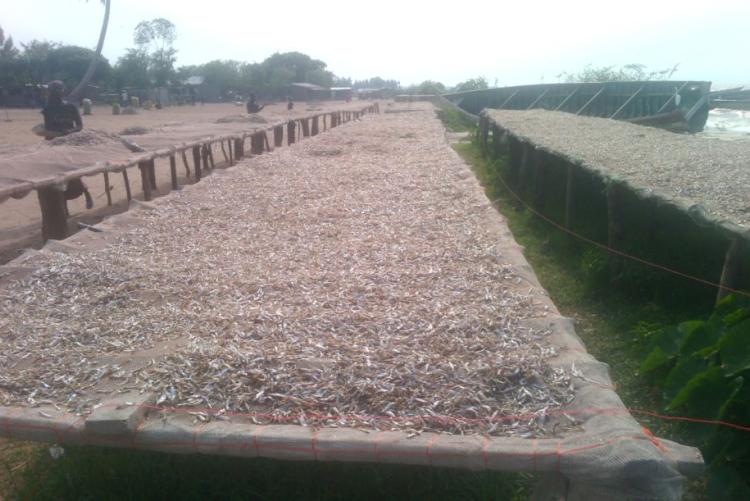Fishermen in Lake Victoria have been encouraged to stop drying the sardines (commonly known as “Dagaa”) by placing them on the sand soon after catching them and instead they have been advised to use crib methods in order to prevent the them from being contaminated with harmful bacteria which cause stomach diseases to consumers.

Sardines on the Cribs
The call was given by Mr. Zebedayo Baniga, a researcher from Sokoine University of Agriculture (SUA) who was conducting a study to identify the risk of contamination of sardines from Lake Victoria under the Innovations and Markets for Lake Victoria Fisheries (IMLAF) project in Mwanza Region whereby he founded that sardines which are properly stored, they are safe and free of harmful bacteria, but the issue of contamination begins during the drying and processing stage.
In the study, Mr. Baniga explained that he looked at the dangerous parasites that cause stomach diseases in humans, especially Salmonella and E. coli which are derived from body wastes (animal or human waste). These parasites cause contamination while sardines is being exposed on the sand and leading to consumer insecurity, while the sardines which is well placed in the crib were found to contain no harmful bacteria and thus safe for consumers.
"We asked sardines processors what kind of sardines they are eating and they said they do not eat sardines which was dried on the sand because they cause stomach disease since they contain sands and this clearly showed that they were aware and when we wanted to find out what was the reason for them to continue putting the sardines in the sand, they explained that they don’t have enough space to build the cribs on the shore” said Mr. Baniga.
Sardines on the sand
Mr Baniga went on to say that sardines dried on the sand is of poor quality compared to those kept on the cribs and thus made a call to all fishermen and sardines processors to use modern drying methods in order to obtain quality and safe sardines for consumers. He added that processors who put sardines on the sand at the lake shores also suffer losses during the rainy season because sardines is absorbed by the water and returned back to the lake thus contributing to pollution and resulting in the reproduction of disease parasites.
For his part, the Secretary-General of the Ministry of Livestock and Fisheries in charge of the Fisheries Sector, Mr. Rashid Tamatama said the Ministry in addition of having various fishing institutions but they are also using research done by higher education institutions like Sokoine University of Agriculture to help improve the sector, so the results of this study will enable the ministry to plan to tackle the challenge.
He said the ministry has set up a Private Sector desk which works with small scale entrepreneurs in linking them with financial institutions to acquire capital that can help them build better sardines drying and processing infrastructure and even some modern fishing tools.
He has commended the good work done by the Sokoine University of Agriculture (SUA) through its researchers in conducting various studies that help develop good fishing industry improvement plans and the entire value chain of the fishing industry. He said that they have already begun the process of implementing directives given by the Minister of Livestock and Fisheries Hon. Luhaga Mpina, a project to develop a system that will enable all research conducted by research institutes and universities on livestock sector to be taken and used by the ministry so as to increase efficiency and productivity.
The IMLAF project began its research activities in 2015 in three administrative regions constituting the Tanzanian side of Lake Victoria; Mwanza, Mara and Kagera regions with the support of the Danish and Tanzania governments. The project is expected to complete its research activities in December this year, 2019.
Read more about this project here: https://www.dprtc.sua.ac.tz/danida/




